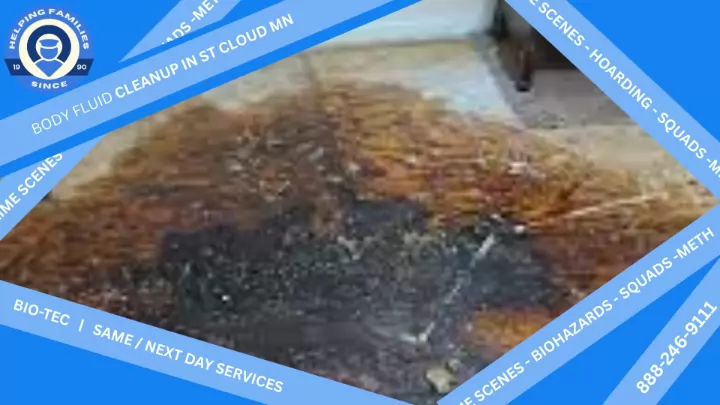🩸 The Scientific Necessity: Why Post Crime Blood And Body Fluid Removal Services Demand Bio-Tec’s Expert Compliance Did you know that handling just one milliliter of contaminated blood without proper protection can transmit deadly pathogens? This startling fact underscores why the cleanup after any traumatic incident is not a cleaning problem it is a public health emergency. When violence, accident, or death occurs, the resulting blood and body fluid removal services must be executed by certified professionals. Ignoring this critical step means risking catastrophic health consequences and facing severe legal liabilities. Standard cleaning methods simply cannot neutrali

Post Crime Blood And Body Fluid Removal
🩸 The Scientific Necessity: Why Post Crime Blood And Body Fluid Removal Services Demand Bio-T...
Expert Bodily Fluid Cleanup Services: How Bio-Tec Ensures Health, Safety, and Compassion Did you know that a single drop of blood can carry pathogens that can live on surfaces for days, or even weeks? The cleanup of human or animal bodily fluids be it blood, vomit, urine, or feces is far more than a simple matter of sanitation. It is a critical biohazard situation. These substances can harbor a dangerous array of bacteria, viruses, and other pathogens that pose a significant health risk to anyone who comes into contact with them.For families, businesses, or property managers in Swift Trail Junction, AZ, the decision to hire a professional for "Bodily Fluid Cleanup ser

Bodily Fluid Cleanup Services
Expert Bodily Fluid Cleanup Services: How Bio-Tec Ensures Health, Safety, an...
How do professionals handle contamination under vehicle dashboards?
Specialized equipment is used to sanitize hard-to-reach areas under dashboards.
?How do you remove decomposition smells from a house?
Removing decomposition smells from a house is a multi-step process that often requires professional intervention, especially if the source is significant or has been present for an extended period. The first and most crucial step is to locate and safely remove the source of the decomposition. This might involve a deceased animal in a wall, attic, or crawl space, or biological fluids from an unattended death or trauma. Once the source is removed, immediate and extensive ventilation is key: open all windows and doors, and use powerful fans to create cross-ventilation, ideally for several days. All porous materials that have absorbed the odor, such as carpets, padding, curtains, upholstery, and even drywall or subflooring if bodily fluids have seeped, should be removed and professionally disposed of as biohazardous waste. Standard cleaning wont suffice. Hard, non-porous surfaces like floors, walls, and ceilings should be thoroughly cleaned multiple times with an enzymatic cleaner specifically designed to break down organic matter and neutralize odors. These cleaners work by using beneficial bacteria to consume the odor-causing molecules, rather than just masking them. After cleaning, specialized odor removal techniques are often necessary. This includes the use of ozone generators or hydroxyl generators. Ozone generators produce O3, a powerful oxidizer that reacts with and neutralizes odor molecules. However, ozone is harmful to living organisms and should only be used in unoccupied spaces. Hydroxyl generators create hydroxyl radicals, which are safer for occupied spaces and mimic the natural cleaning power of sunlight. These machines should run for extended periods, potentially days, depending on the severity of the odor. Finally, a thorough air purification system with HEPA filters can help remove any remaining airborne odor molecules and particulate matter. For complex or severe cases, sealing affected surfaces with an odor-blocking primer before repainting can also be effective.
What defines the Active Decay stage?
In Active Decay, the body loses mass as tissues break down. Maggots and scavengers consume the remains, and fluids seep into the surrounding environment, affecting vegetation.
What should be done when biohazards contaminate vehicle foot pedals?
Foot pedals are sanitized using precision tools to remove pathogens without affecting functionality.
How is the effectiveness of the cleaning measured?
Effectiveness is verified through visual inspections, residue testing, and the issuance of clearance documentation.
How do I disclose past meth contamination to potential buyers or renters?
Disclosure requirements vary by jurisdiction, but generally, sellers and landlords are obligated to inform potential buyers or renters of past meth contamination and remediation efforts. Full transparency helps manage liability and ensures that occupants are aware of the propertys history.
What are the benefits of air quality testing in hospitals?
In healthcare settings, maintaining optimal air quality is vital to preventing the spread of airborne pathogens and protecting patient health. Air quality testing in hospitals detects pollutants like bacteria, viruses, mold, and chemical fumes that may compromise sterile environments. Testing also identifies issues with HVAC systems that could contribute to poor air circulation or contamination. Addressing air quality concerns helps reduce hospital-acquired infections and enhances the recovery environment for patients. For staff, it ensures a safer workplace, minimizing exposure to harmful substances. Hospitals that invest in regular air quality testing demonstrate their commitment to patient care and safety while complying with healthcare standards and regulations.
What protocol applies if the vehicles ventilation system spreads pathogens?
The HVAC system is cleaned, disinfected, and tested for operational safety.
What is done if bodily fluids contaminate law enforcement equipment stored in the vehicle?
The equipment and storage areas are sanitized thoroughly to eliminate all risks.
How do cleaners handle biohazard cleanup in extreme weather conditions?
Portable equipment and climate-appropriate strategies are employed to ensure effective cleanup regardless of weather.
